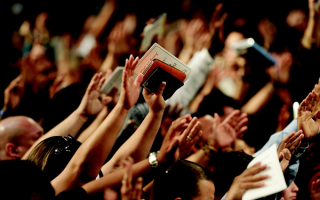Raised an Atheist, now a Bible translator

From atheism to faith
When Farrokh was growing up his country was part of the Soviet Union. He was taught in the education system that there was no God. As a teenager he was a bit of a rebel, getting into trouble and even abusing alcohol and drugs.
Then he began to wonder if there really was a God: “I tried to think, what’s going on? Why are people talking a lot about God? If there is a God, then I have to obey. If there is no God, like we learned in school, then I can continue to live how I live.” He then began to explore what it might mean to believe in God.
First, he explored Islam, since many people in his country adhere to that faith. He read the Qur’an in Russian. He also looked into Hinduism, because there are some people in his country who worship Krishna. Finally, Farrokh met a Russian man who had come to his country to lead people to Christ, even while Farrokh’s country was in the middle of a terrible civil war:
“He came during wartime to tell people about Christ. We had a lot of conversations. Days, nights, days, nights. When I became a Christian, my relationship with my parents deteriorated.” They were disappointed that he became a Christian because they wanted him to be an atheist like other good citizens of the USSR.
The call of Bible translation
Farrokh then went to Russia to study theology. There, he met a woman who worked for the Institute for Bible Translation (IBT): “She talked to me about Bible translation. I started to work for IBT and I was trained how to do Bible translation. We started with John’s Gospel.” However for various reasons this project had to be stopped.
Farrokh returned to his home country still carrying the conviction to translate the Bible into his own language. Fortunately, he soon met a man who had just started working on a translation into Farrokh’s language. There is technically already a Bible in this language, but it is written in highly academic language. This version is so heady that it is difficult for most everyday people to understand it properly. That is why Farrokh joined the project to make a new translation, involving a number of partner organizations. He was enthusiastic about the opportunity:
“Now I’m happy that God used me. He first saved my heart, and my life, then he used me to do this work for others who are not saved yet, in mountains and villages.”
Keeper of the peace
Farrokh’s love for people goes back to his childhood, when he grew up in the Soviet Union. He told me that when he was in primary school, other national boys would bully Russian boys because they felt like they didn’t belong. Farrokh was the one who would act as peacekeeper:
“The Russians were afraid. I was one who always stood up for Russians. I said, ‘No, you will not beat this person.’”
He recounted growing up in the USSR and how overall it was a good experience. The Central Asian Soviet Socialist Republics saw a lot of improvements to their infrastructure and industry. In fact, many of Farrokh’s countrymen reminisce about the times under communism as the good old days: “We lost what we had in Soviet times,” Farrokh said, referring to a steady working income and a healthier economy in the country. He then reflected on his people, and their affinity towards peace:
“[My people] lost their authority position in Central Asia because they are not aggressive. They are poets. They love the traditions. They are peacemakers, I think.” The culture of his country has a big focus on music and literature. That is another reason why this Bible translation is so important to Farrokh. He told me how he began his contribution to the project:
“I tried to translate [the Gospel of] John from Russian and Greek. Greek is similar to Russian… Hebrew is much more difficult than Greek. I still remember a little Greek but not Hebrew.” Knowing Russian as a second but fluent language proved to be a huge help when learning New Testament Greek.
From St Cyril to Farrokh
The Cyrillic alphabet, used for Russian and several other languages in Eastern Europe and Central Asia, was developed from the Greek alphabet, just like the Latin alphabet was. St. Cyril and his brother, St. Methodius, brought it to the Slavic peoples from Byzantine Greece in order to preach the gospel to the Slavs, and to teach them how to read and write. Creating orthographies for Bible translation, thus, has a very long history in the world of sharing the Gospel.
While he did not need to create an orthography, Farrokh is carrying on that tradition of Bible translation for his people in Central Asia:
“It was God’s call for me to do this work, and I love it. I try to do good a translation of the Word that will help others become Christians.” Please pray that Farrokh will be able to see the fruits of his labors with a new, contemporary, accurate Bible translation, that his work can continue in peace, and that the translation will soon be finished and distributed without hindrance.
Old Harbour News is a community-based online news media outlet based in Jamaica with more than 300,000 unique visitors since 2013. However, we are soliciting your support to continue provide independent journalism and unique stories tailored just for you. Your contribution, however small it may be, will ensure our service to you remain independent and grow to serve you better. Click the DONATE BUTTON now to support Old Harbour News. Thank you.




























